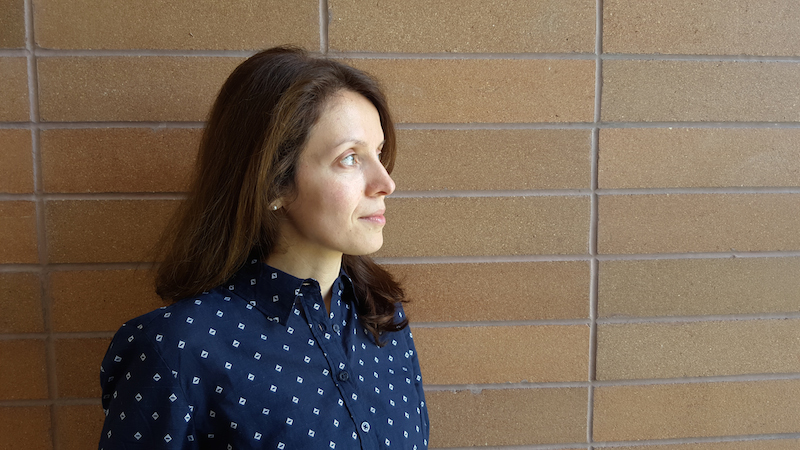
Fereshteh Amini
Fall 2016
Canadians butcher her name so often she no longer notices. Fer-rish-t-ea.
“I tell people to think of it like saying ‘fresh tea’,” she says.
“Is that your nickname too?”
“No,” she says. “My name actually means Angela so I just tell people to call me that. It’s easier for them.”
Fereshteh Amini [MSc/08] is an easy-going and gregarious software developer who is months away from defending her PhD. She is the only female PhD student in her lab and her research focuses on democratizing data.
She is one of roughly 3,800 students enrolled in the University of Manitoba’s Faculty of Graduate Studies and UM Today sat down with her to chat about what she does, and why.
UM TODAY: Where are you from?
FERESHTEH AMINI: Iran.
How did you end up at the U of M?
I moved to Winnipeg with my husband for studies. He started his PhD and I started my master’s. That was back in 2003. So it’s been awhile.
I finished my master’s in 2008 and I started working at a local company for four and a half years but came back to school for my PhD and now I’m in my last year.
Does anything strike you as being remarkable about Canadian culture?
It’s been so long I don’t even remember what the first thing was that struck me the most. It’s such a different culture.
The very first thing you would notice coming from a country with a lot of people is how friendly people are here because there are less people to deal with. Especially at the university – in Iran there are so many students that by the time university offices get to you they just give you quick answers and nothing more. But here, they recognize you as a human being first, then a student. So that was very cool to see.
If you’re at a cocktail party, what do you say your research involves?
I usually tell people that my PhD is about how to tell stories about data. We have so much data that we gather – each person collects so much data from their cell phones for instance – it can quickly become a massive amount of data that you don’t know what you can get out of it and once you do, it is hard to communicate that to people
As a researcher, I look at this data and try to get the insights from it and communicate that in an easy manner with a broad audience. It has to be simple.
I have chosen to do this with video – something called data videos. You see them all over the internet. There was a recent one on World War 2, and before that one of the first ones was a video showing the income inequality in the US. They had all these data and numbers, but in a very understandable way to a general audience. That was very interesting to me when I saw these videos, which was in my first year of my PhD. And I thought, well, maybe I could make these videos easier for people to create.
How did you get into this line of work?
I enjoy working with people, and a big umbrella of my work is human-computer interaction. Obviously people coming to this field are interested in what human beings are interested in or how they use technology.
I became interested in the field when all the talk about big data was going on. And I started thinking about how we can close the gap between the process of data analysis – where people are understanding this data – and communicating the insights they gain from it.
It all started from a video that was so simple, yet it had so much complexity down in the data level. I was hooked and decided I had to do something with this. Now, when I show people some of the videos I have made using my software, they start thinking about how they can use it with their data to create similar videos.
I am also lucky to have had good mentors during my studies who have guided me through my research. Aside from my supervisor, Dr. Irani who is the main inspiration behind all my work, I have also had the opportunity to work with several other researchers and in particular as an intern at Microsoft Research in Seattle and obviously, working with such great minds was very inspirational.
Is your goal to create tools to empower people – to let them speak out more?
Exactly. Liberating data.
Would you call yourself a disruptor? Is that a goal of budding PhD in your field?
In our lab we are always looking for things that are going to change how people use a technology. The technology comes around and people don’t naturally know what to do with it, so we try to understand their needs and make them change the way they think about life with the new technology.
One of my recent projects looks at how smart gadgets – phones and watches and fitness bands – can be better used. People are taking a peek at their devices during their activities because they are collecting all this data. I’m in the process of trying to understand how people would use this technology during their activity – so while they’re biking or running. What are their needs? Maybe it’s about finding a way for quickly conveying as much information as possible without distracting the person because it’s not safe to bike and look at your data at the same time. But maybe there is a way to do that and I would like to figure that out.
Why did Google Glasses fail?
There’s a big debate about that. Personally I think sometimes the technology comes before all the pieces are in place. With Google Glasses they weren’t expecting people to use it the way they did and I think that was from a lack of knowledge about users’ need.
So they took it off the market and are looking for ways to make it better match user needs.
What it is you like about computer science?
I am not sure. I grew up with two brothers and they liked playing computer games and I started playing myself. And it was fascinating to me. I began wondering what I could do to make the game better. I started coming up with ideas and realized there was a computer program behind the game and I could write the program. That was the first reason I considered computer programming and I started playing with simple programs.
What did you want to be a kid growing up?
Back in Iran we don’t have a lot of freedom in terms of what you want to do in your carrier. But my dad was a doctor and I wanted to be a doctor but it seemed like a lot of hard work – he was working all the time.
I was good at math and computer science requires a good math background. And in my country whatever you’re good at is what you usually end up studying. But after a couple of years of school and getting familiar with computer programs, I fell in love with the way algorithms work, and my brain naturally looks at things in life in zeroes and ones, the type of thinking required to write an algorithm. You either hate it, or you really, really like it. There’s no in-between.
Do you go back to Iran often?
Almost every year.
Do you miss anything right now?
Not really. I have been here so long I don’t really miss anything. And there are a lot of good Iranian restaurants in Canada. So I don’t miss the food.
What restaurant would you recommend?
If you want a good Iranian kebab, which is the best kebab ever, you can try Tehran Café. A simpler take-out place called George’s Submarine, also has a good Iranian kebab.
What are your hobbies?
I swim a lot. I have always loved swimming, but these days I don’t get a lot of free time. If I can find time to read a book not related to my field I would call that day a success.
I would love to have more time to go hiking and to be in nature a bit more.
What’s the best advice you have ever received?
The best advice I ever received was not to be afraid of failure. Failure is how you learn. It’s how you become stronger.
Who gave you this advice?
I don’t know. I forget. It may have even been social media.
What’s your favourite social media platform?
I’d say Twitter. It’s how I connect to researchers in my field and it’s so easy to see what they’re doing and thinking about at the moment. It’s incredible that I can know what my role models in the field are thinking about, instantly.
What was your first memory?
It was in my grandma’s backyard. She had a little pond with some fish in it and I was small enough to swim in it. I remember that. I spent a lot of time there because both of my parents worked. Those were very fond memories. I wish I could go back and tell myself to enjoy those moments even more.









I am always proud of you for being such a successful Woman ❤️❤️❤️